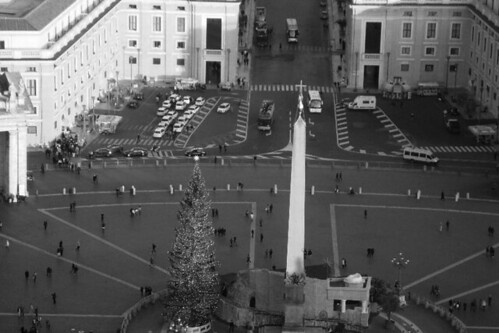
Columnist Matt Flocco thinks science and religion don’t have to be combating views.
I’ve said it before, and I’ll say it again: Christianity is not that distant from ancient mythology.
Countless stories recall how Zeus came down to Earth and mated with mortals, creating demigods.
For some Christians, especially Catholics, it is believed that Jesus Christ was conceived by the Holy Spirit and born of the Virgin Mary. Then is it not true that God Himself came down and mated with a mortal, just like Zeus, and that the mortal gave birth to a demigod?
When I brought this up in class last week, a heated conversation ensued. Some students in the class were atheists, some agnostic, some Jewish, some Christian and some monotheistic. But one friend brought up a major difference between the two – mythology was also used to explain natural phenomena.
I just finished reading Dan Brown’s controversial book “Angels & Demons” – a work that’s major theme is the war between science and religion. In the novel, scientist Maximilian Kohler states the following in regards to these natural phenomena and belief in God:
“Spirituality and religion have been called on to fill in the gaps that science did not understand. The rising and setting of the sun was once attributed to Helios and a flaming chariot. Earthquakes and tidal waves were the wrath of Poseidon. Science has now proven those gods to be false idols. Soon all gods will be proven to be false idols. Science has now provided answers to almost every question man can ask. There are only a few questions left …Where do we come from? What are we doing here? What is the meaning of life and the universe?”
At the beginning of the story, a team of scientists led by a priest set out to find the answers and prove God’s existence through physics. They are able to recreate the Big Bang Theory, proving that matter can come from a highly dense point of singularity. Despite Kohler’s personal belief, this team explains God is the energy that creates it.
So maybe the story of Adam and Eve isn’t exactly correct, but we still had to come from somewhere. It must be clear to physicists that because matter can be neither created nor destroyed, something must have always been there, something eternal: God.
For those who do not believe in a higher power because of science, the words of the character Camerlengo Ventresca are perfect:
“Show me proof there is a God, you say. I say use your telescopes to look to the heavens, and tell me how there could not be a God!”
The only flaw of this character is that in his astute belief, he refuses to see the wonder science brings. He said it destroyed God’s miracles.
To those who are so set in their religion that they refuse to ignore the beauty of science, I say this: So what?
So what if science can explain the colors of a rainbow or the symmetry in a body? This does not destroy their power. Science didn’t create these miracles. It interprets them.
Religion and art do the same thing. They didn’t create the universe either, yet they exist so we can try to understand and interpret the meaning of the world around us.
To those who understandably doubt God’s existence because of all the conflict caused by religious clashes, here is a quote from Vittoria Vetra, a devout Catholic and brilliant scientist in the book:
“We gravitate toward the [religion] with which we were raised … though, we are all proclaiming the same thing. That life has meaning … Look at the diffusion of religion around the globe…Faith is universal. Our specific methods for understanding it are arbitrary. Some of us pray to Jesus, some of us go to Mecca, some of us study subatomic particles. In the end we are all just searching for truth, that which is greater than ourselves.”
Religion is overrated. The connection between you and your higher power is so much more important than the rituals you perform.
My God does not exist through politics. He exists through the love of my family and friends, the blessings of art I see and the music I hear and the miracles He performed. Where does yours exist?
Matt Flocco can be reached at matthew.flocco@temple.edu.


Be the first to comment